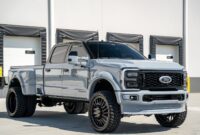Medium Duty Trucks For Sale Florida: Your Comprehensive Guide to Driving Business Growth sale.truckstrend.com
Florida’s vibrant economy, fueled by rapid population growth, booming tourism, construction, and a thriving logistics sector, creates an undeniable demand for robust commercial vehicles. At the heart of this demand are medium duty trucks. More versatile than their light-duty counterparts and more agile than heavy-duty behemoths, these workhorses are the backbone of countless businesses across the Sunshine State. If you’re looking to expand your fleet, start a new venture, or upgrade your current capabilities, understanding the market for medium duty trucks for sale in Florida is crucial. This comprehensive guide will navigate you through everything you need to know, from selection and purchase to financing and maintenance, ensuring you make an informed decision that propels your business forward.
Understanding Medium Duty Trucks: What Are They?
Medium Duty Trucks For Sale Florida: Your Comprehensive Guide to Driving Business Growth
Medium duty trucks are defined by their Gross Vehicle Weight Rating (GVWR), typically falling into Classes 4 through 6. This translates to a GVWR range of 14,001 to 26,000 pounds. They bridge the gap between consumer-grade pickup trucks and the massive semi-trucks that traverse highways. Their sweet spot lies in their balance of payload capacity, maneuverability, and operational efficiency, making them ideal for a wide array of applications.
Common types of medium duty trucks you’ll find for sale in Florida include:
- Box Trucks (Straight Trucks/Cube Vans): Widely used for parcel delivery, moving services, and general freight, offering enclosed cargo space.
- Flatbed Trucks: Perfect for transporting construction materials, machinery, landscaping supplies, and other bulky items that don’t require enclosed protection.
- Dump Trucks: Essential for construction, landscaping, and waste management, capable of hauling and unloading loose materials like sand, gravel, and dirt.
- Utility & Service Trucks: Equipped with specialized compartments and often cranes or lifts, serving plumbers, electricians, telecom companies, and other field service professionals.
- Refrigerated Trucks (Reefers): Critical for food distribution, florists, and pharmaceuticals, maintaining specific temperature ranges for perishable goods.
- Stake Body Trucks: Similar to flatbeds but with removable side stakes, offering flexibility for various cargo types.

These vehicles are built for durability and continuous operation, designed to handle the rigorous demands of daily commercial use across Florida’s diverse terrains, from urban streets to construction sites and rural farmlands.
Why Florida is the Ideal Market for Medium Duty Trucks
Florida’s unique economic landscape makes it a prime location for the buying and selling of medium duty trucks.

- Booming Economy & Population Growth: Florida consistently ranks among the fastest-growing states, driving demand in construction, housing, retail, and service industries – all reliant on efficient material and goods transport.
- Diverse Industries: Beyond tourism, Florida boasts robust agriculture (citrus, produce), extensive logistics and warehousing networks, a flourishing marine industry, and a constant need for infrastructure development. Each sector has specific medium duty truck requirements.
- Strategic Logistics Hub: With major ports (Miami, Port Everglades, Tampa) and an extensive interstate highway system, Florida is a gateway for goods movement, requiring a strong fleet of distribution and last-mile delivery vehicles.
- Climate Considerations: While the constant heat and humidity can be tough on vehicles, the lack of harsh winters means less concern about rust from road salt, potentially extending vehicle life for those properly maintained. However, robust air conditioning and cooling systems are paramount.

The sheer volume of commercial activity ensures a healthy supply of both new and used medium duty trucks for sale in Florida, offering buyers a wide range of options to suit their budget and specific needs.
Key Considerations When Buying a Medium Duty Truck in Florida
Navigating the purchase of a medium duty truck requires careful thought. Here’s what to consider:
-
New vs. Used:
- New: Offers the latest technology, full warranties, and customization options. Higher initial cost but potentially lower immediate maintenance. Dealerships across Florida can facilitate this.
- Used: Significant cost savings, quicker depreciation has already occurred. A larger variety of body types and configurations are available immediately. However, requires thorough inspection and understanding of maintenance history. Florida’s vast used truck market offers ample choice.
-
Budget & Financing:
- Beyond the sticker price, factor in insurance, registration, maintenance, fuel, and potential upfitting costs.
- Explore financing options: traditional bank loans, dealership financing, and specialized commercial vehicle lenders. Many Florida-based financial institutions are well-versed in commercial truck financing.
- Consider leasing as an alternative, which can offer lower monthly payments and tax advantages.
-
Vehicle Type & Application:
- This is paramount. Do you need a box truck for urban deliveries, a flatbed for construction materials, or a refrigerated truck for food transport? Match the truck’s capabilities (payload, engine power, chassis configuration) precisely to your business operations.
- Think about the specific routes in Florida: tight city streets might require a shorter wheelbase, while longer highway hauls benefit from more fuel-efficient engines.
-
Fuel Type (Diesel vs. Gasoline vs. Emerging Alternatives):
- Diesel: Typically offers better fuel efficiency, more torque for heavy loads, and longer engine life. Dominates the medium duty market.
- Gasoline: Lower upfront cost, often quieter, and easier to maintain for some mechanics. Becoming more common in certain GVWR ranges.
- Alternative Fuels (CNG/Propane/Electric): While still niche, Florida is seeing a slow but steady increase in charging/fueling infrastructure. Consider for environmental benefits and potential long-term fuel savings if infrastructure is accessible for your routes.
-
Maintenance & Service:
- Research the availability of authorized service centers and parts for your chosen make and model throughout your operational area in Florida. Downtime is costly.
- Consider a truck with a strong reputation for reliability to minimize unexpected repairs.
-
Regulatory Compliance:
- Understand DOT regulations. Trucks with a GVWR over 26,000 lbs (Class 7-8) generally require a Commercial Driver’s License (CDL). Medium duty trucks (Class 4-6) typically do not require a CDL for non-hazardous materials, making them accessible to a wider pool of drivers. However, specific operations or combined weight with a trailer might necessitate one. Always verify Florida-specific DMV requirements.
Where to Find Medium Duty Trucks For Sale in Florida
The Florida market offers numerous avenues for sourcing medium duty trucks:
- Authorized Dealerships (New & Used): Brands like Isuzu, Hino, Fuso, Ford, Freightliner, International, and Kenworth have strong dealer networks across major Florida cities (Orlando, Miami, Tampa, Jacksonville). They offer new models, certified pre-owned trucks, and often provide financing and service packages.
- Independent Used Truck Lots: These specialized dealerships focus solely on pre-owned commercial vehicles, often providing a diverse inventory from various manufacturers. They can be a great source for specific upfits.
- Online Marketplaces: Websites like TruckPaper.com, CommercialTruckTrader.com, and even general classifieds like Craigslist or Facebook Marketplace can list trucks from both dealers and private sellers. Be cautious and verify listings.
- Auctions: Public and commercial vehicle auctions (e.g., Ritchie Bros., IronPlanet, local government auctions) can offer opportunities to acquire trucks at competitive prices, but often come with "as-is" conditions and require keen inspection.
- Private Sellers & Business Liquidations: Businesses upgrading their fleet or closing down may sell their trucks directly. Look for local business classifieds or network within your industry.
The Buying Process: A Step-by-Step Guide for Florida Buyers
- Define Your Needs: Precisely determine the type of truck, payload capacity, engine power, and features required for your business.
- Set Your Budget: Include all associated costs, not just the purchase price.
- Research & Identify Potential Trucks: Utilize online resources, visit dealerships, and attend local truck shows or auctions in Florida.
- Thorough Inspection (Crucial for Used Trucks):
- Visual Check: Look for rust (especially important near coastal areas), fluid leaks, tire condition, and body damage.
- Engine & Drivetrain: Check fluid levels, listen for unusual noises, look for smoke.
- Interior: Test all controls, HVAC (critical in Florida), and lights.
- Upfit/Body: Ensure the box, flatbed, or specialty equipment is in good working order.
- Service Records: Request detailed maintenance history.
- Pre-Purchase Inspection (PPI): Highly recommended for used trucks. Hire an independent, certified mechanic specializing in commercial vehicles to perform a comprehensive inspection. This small investment can save you thousands down the line.
- Test Drive: Evaluate performance under conditions similar to your intended use. Pay attention to braking, steering, acceleration, and transmission shifting.
- Negotiation: Be prepared to negotiate price, warranty (if applicable), and any included services.
- Financing & Insurance: Secure your financing and arrange for commercial vehicle insurance. Florida requires specific insurance minimums for commercial operations.
- Paperwork & Registration: Complete all necessary title transfers and registration with the Florida Department of Highway Safety and Motor Vehicles (DHSMV). Ensure all lien information is correctly recorded.
Tips for Maintaining Your Medium Duty Truck in Florida’s Climate
Florida’s unique climate presents specific challenges for vehicle longevity:
- Heat & Humidity: Ensure your truck’s cooling system (radiator, hoses, coolant levels) is in top condition to prevent overheating. Regular AC checks are vital for driver comfort and efficiency.
- Salt Air Corrosion: If operating near coastal areas, regular washing, especially the undercarriage, is essential to combat salt air corrosion. Consider rust-proofing treatments.
- Tire Care: High temperatures can increase tire pressure and wear. Regular checks and proper inflation are critical for safety and fuel economy.
- Fluid Checks: Monitor all fluid levels (oil, transmission fluid, brake fluid, power steering fluid) more frequently due to heat.
- Preventative Maintenance: Adhere strictly to the manufacturer’s recommended maintenance schedule. Proactive maintenance is always cheaper than reactive repairs.
Challenges and Solutions
- Finding the Right Specialized Truck: If your business requires a highly specialized upfit, new trucks allow for custom orders. For used, be patient and broaden your search to a wider Florida radius or specialized brokers.
- Navigating Financing: If you have limited business credit, explore alternative lenders or consider lease-to-own options. Building a strong relationship with a commercial bank can also help.
- Ensuring Proper Maintenance: Establish a relationship with a reputable commercial truck service center in your area of Florida. Consider maintenance contracts offered by dealerships.
Representative Medium Duty Truck Price Estimates (Florida Market)
Please note that these are estimated price ranges and can vary significantly based on make, model, year, mileage, condition, specific upfitting, engine type, transmission, and market fluctuations. Prices for new trucks are MSRP and can be subject to dealer incentives or discounts. Used truck prices depend heavily on wear and tear.
| Truck Type | GVWR Range (Approx.) | New (MSRP) Range (USD) | Used (3-7 Years Old) Range (USD) | Common Applications |
|---|---|---|---|---|
| Box Truck | 14,001 – 26,000 lbs | $55,000 – $110,000+ | $25,000 – $75,000+ | Local delivery, moving, logistics, retail distribution |
| Flatbed Truck | 14,001 – 26,000 lbs | $60,000 – $120,000+ | $30,000 – $80,000+ | Construction, landscaping, equipment transport, farming |
| Dump Truck | 19,501 – 26,000 lbs | $80,000 – $150,000+ | $40,000 – $100,000+ | Construction, demolition, landscaping, waste hauling |
| Refrigerated Truck | 14,001 – 26,000 lbs | $75,000 – $160,000+ | $35,000 – $90,000+ | Food & beverage distribution, pharmaceuticals, florists |
| Service/Utility Truck | 14,001 – 26,000 lbs | $70,000 – $130,000+ | $35,000 – $85,000+ | Field service, municipal work, telecom, electrical |
Disclaimer: These figures are estimates for the Florida market and should be used as a general guide. Always obtain specific quotes from dealers or sellers for accurate pricing.
Frequently Asked Questions (FAQ)
Q1: What is considered a medium duty truck?
A1: Medium duty trucks typically fall into Class 4, 5, or 6 based on their Gross Vehicle Weight Rating (GVWR), ranging from 14,001 pounds to 26,000 pounds.
Q2: Do I need a CDL to drive a medium duty truck in Florida?
A2: Generally, no. In Florida, a standard Class E driver’s license is sufficient for operating medium duty trucks (Class 4-6) if their GVWR is under 26,001 pounds and they are not transporting hazardous materials requiring placarding, or operating a vehicle designed to transport 16 or more passengers (including the driver). However, always verify specific regulations based on your exact vehicle and cargo.
Q3: Is it better to buy new or used medium duty trucks in Florida?
A3: It depends on your budget and needs. New trucks offer warranties and the latest features, while used trucks are more affordable and depreciate less. Given Florida’s active market, both options offer good selection. A pre-purchase inspection is highly recommended for used vehicles.
Q4: What are common applications for medium duty trucks in Florida?
A4: They are widely used for local deliveries (parcel, food, retail), construction (dump trucks, flatbeds), landscaping, utility services, refrigerated transport, and general freight hauling due to their versatility and maneuverability.
Q5: What financing options are available for medium duty trucks in Florida?
A5: You can finance through traditional banks, credit unions, dealership financing, and specialized commercial truck lenders. Leasing is also a popular option for businesses.
Q6: How does Florida’s climate affect truck maintenance?
A6: The heat and humidity necessitate robust cooling systems and efficient AC. For coastal operations, regular washing and rust prevention are crucial due to salt air. Consistent preventative maintenance is key to longevity in this environment.
Conclusion
Investing in a medium duty truck for your Florida business is a strategic decision that can significantly impact your operational efficiency and growth. The state’s dynamic economy and diverse industries create a robust market, offering a wide array of options from new, customizable models to cost-effective used vehicles. By thoroughly understanding your specific needs, diligently researching the market, performing comprehensive inspections, and planning for ongoing maintenance in Florida’s unique climate, you can confidently acquire a workhorse that serves your business reliably for years to come. With the right medium duty truck, you’re not just buying a vehicle; you’re investing in the future of your Florida enterprise.




